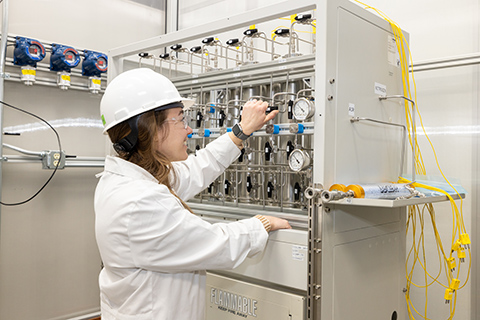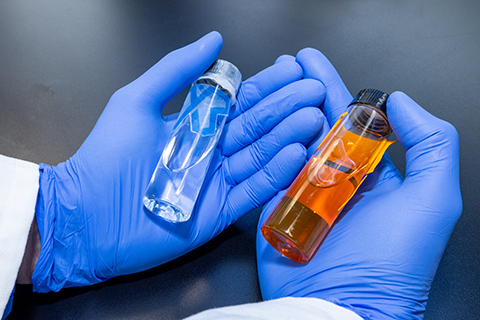NREL and Crysalis Biosciences Collaborate To Scale Up Domestic Biomanufacturing Technologies
Public-Private Partnership Advances Research That Turns US Biomass Into National Sources of Fuel, Rubber, and Battery Materials

The U.S. Department of Energy’s (DOE’s) National Renewable Energy Laboratory (NREL) is known for its groundbreaking research in impactful bioenergy technologies and invention of performance-advantaged chemicals and materials. But some of its most exciting success stories happen when those innovations move beyond the lab and into the real world.
A prime example of this technology transfer in action is the collaboration between NREL and Crysalis Biosciences (now Safion Renewables), a leading American manufacturer of next-generation biofuels and biochemicals. Based on research initially funded by DOE’s Bioenergy Technologies Office, NREL granted Crysalis commercial licenses to three novel biological technologies to produce bio-based chemicals and fuels, including:
- 2,3-Butanediol (2,3-BDO): This technology leverages a modified strain of Zymomonas mobilis to produce 2,3-BDO instead of ethanol, which can be used to produce polymers and butadiene, a key ingredient in bio-derived rubber for tires.
- Carboxylic Acids to Aviation Fuel: This process converts America’s plentiful sources of waste and biomass into carboxylic acids, which can be upgraded to a jet fuel blendstock, serving as an abundant energy source for export and the domestic aviation industry.
- Acetonitrile: This process allows for the production of ultrahigh purity acetonitrile, a high-demand solvent in pharmaceutical manufacturing, as well as other high-performance, high-volume materials like advanced batteries.
The licensing of these three technologies showcases how the NREL/Crysalis partnership can leverage America's plentiful biomass and waste feedstocks—more than 1 billion tons according to a recent DOE study—to drive homegrown production of critical materials and agricultural products the country needs and reduce its reliance on imports.
From Lab Innovation to Market Impact
With these advancements in hand, Crysalis’ R&D facility in Louisville, Colorado, recently produced the world’s first 100% bio-based acetonitrile with the highest purity available on the market. The pathway was scaled up 300 times from NREL’s lab-scale technology.

“I don’t think anyone realized that we could achieve this scale and that the NREL technologies could get out into the world so quickly,” NREL Senior Licensing Executive Eric Payne said. “This project is so amazing; we are lucky to work with such dedicated partners.”
According to Crysalis Chief Technology Officer Eric Karp, the company purchased a shuttered manufacturing space and, in the span of only one-and-a-half years, Crysalis gutted, cleaned, and built out the new facility—often with refurbished equipment customized by their team to realize huge time and cost savings. The resulting Louisville pilot plant is unique in the industry and started producing acetonitrile in February 2025.
“The reactor designs came straight from NREL but were scaled up 300 times,” Karp said. “We built the system with plug-and-play capabilities to use in different ways, by moving and changing equipment around for different processes.”
Crysalis is poised to take this breakthrough development to the next stage with construction of a demonstration-scale manufacturing plant in the St. Louis area. That plant will then aid in the eventual construction of a full-scale bio-acetonitrile manufacturing facility, and the company anticipates commercial availability of the product within a year.
Making More Fuels and Chemicals Here at Home
All three of NREL’s technologies licensed to Crysalis will lead to more resilient supply chains of critical materials and chemicals needed by the U.S. economy.
For example, rubber is a critical strategic material for the United States, and the bio-derived rubber produced by Crysalis via the NREL 2,3-BDO process can fill this need with stateside manufacturing. Many U.S. petroleum refineries also rely on imported crude oil for their operations. NREL’s carboxylic acids-to-fuels technology produces ketones, which can be processed in existing petroleum refineries, thus reducing dependence on imported crude oil.

Finally, acetonitrile is a critically important industrial chemical with applications such as solvents for the pharmaceutical industry and batteries. Today’s fast-charging lithium-ion batteries rely on acetonitrile, and, accordingly, the market for this solvent is expected to be strained with increased demand from automotive applications. Ultrapure acetonitrile is also highly sought after by the pharmaceutical industry due to the expansion of oligonucleotide drug synthesis, a process to create short DNA or RNA sequences that target specific genes or proteins to treat or manage diseases. The Crysalis and NREL process will meet these growing demands with domestic resources and technology.
Revitalizing Local Economies by Creating Manufacturing Jobs
For Crysalis, these technologies also represent an opportunity to transform shuttered chemical plants into profitable, next-generation biomanufacturing hubs. In fact, Crysalis specializes in acquiring and retrofitting shuttered industrial assets—such as the St. Louis plant—to produce bio-based chemicals and fuels and to rehire former employees eager to reclaim their jobs.
“In this case, we bought an ethanol plant that had been shuttered since 2019, and we turned it back on within a year,” Karp said. “This is another thing we've learned from our projects—they are important to the community. There were a lot of jobs, and people are willing to come back to them when you reopen the plants. It's amazing.”
Payne agreed: “What Crysalis is doing in St. Louis—in addition to making ethanol and eventually acetonitrile—is creating jobs and rehiring people," he said. "That translates to jobs in Colorado, too—and I’m proud that NREL technology helped enable this.”
A Model for Future Collaborations
The licensing of these technologies represents a success story for industry–government partnerships. Payne emphasized the speed and scale at which these innovations are moving into the market.
“What is special is that it took less than a month from the time we sent Crysalis these three licenses to the time that we signed the paperwork,” Payne said. “It rarely goes that fast, but Crysalis was really motivated, and it's been a great partnership.”
“In the future, we hope to purchase more facilities and do this over and over as our global business model,” Karp said. “Even just one retrofitted plant built from existing infrastructure is having a considerable impact, but if we can start increasing the number of projects down the road, it'll make a substantial difference to the economy.”
As NREL continues to partner with companies like Crysalis, the laboratory’s research is not just advancing science—it is actively shaping the future of an abundant, resilient, and affordable energy industry.
Learn more about NREL’s scale-up and piloting of bioenergy and bioeconomy technologies.
Last Updated May 28, 2025
